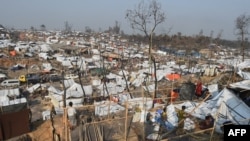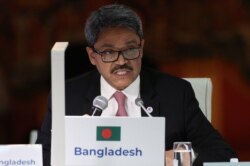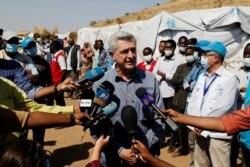At the launch of this year’s Rohingya refugee donor’s conference, Bangladesh led a chorus of growing voices calling for durable solutions to resolve the ongoing crisis.
New pledges have been rolling in, but U.N. agencies are expressing concern about donor fatigue. They worry they might not receive the $943 million they need to assist 1.4 million Rohingya refugees and the Bangladeshi communities hosting them in Cox’s Bazar.
Last year, the U.N.’s $1 billion Joint Response Plan garnered only 60% of that amount. Bangladesh State Minister for Foreign Affairs Shahriar Alam said the launch is the fourth annual appeal for the Rohingya temporarily sheltering in his country.
He said he wondered how long the refugees can continue to suffer in overcrowded camps and how long the international community can sustain such massive humanitarian support. He said it is important to seek a permanent solution to the Rohingya refugee crisis to avoid repeating similar exercises every year.
“All undertakings under the JRP (Joint Response Plan) or any other funding mechanism should be implemented given this overarching objective in mind," Alam said. "The priority areas that have been identified in the JRP must be aligned with the core objective of preparing the Rohingyas for their return and any project, such as education or skill development, should be designed and implemented in ways that will help Rohingyas to integrate into their society on their return to Myanmar.”
The minister acknowledges this might not be the most propitious time for the Rohingya to return home.
U.N. High Commissioner for Refugees Filippo Grandi agrees the military coup by Myanmar’s generals on February first precludes the safe and dignified return of the refugees.
He said the UNHCR and other agencies are present in Rakhine State in Myanmar to create the conditions necessary for the refugees to return to their homes of origin.
“Clearly this has not happened so far because besides the work that we do, more work, more action needs to be taken on the Myanmar side in terms of freedom of movement, access to services, ending the discrimination that has caused, in fact, the exodus of people into Bangladesh,” Grandi said.
Meanwhile, High Commissioner Grandi said the Rohingya people must not be forgotten. He says the international community must continue to support the refugees as they have no other means of survival.
He notes Rohingya continue to flee violence in Myanmar. He renews his appeal to neighboring countries, mainly India and Thailand, to keep their borders open and not to deport them back to a country where their lives are at risk.






